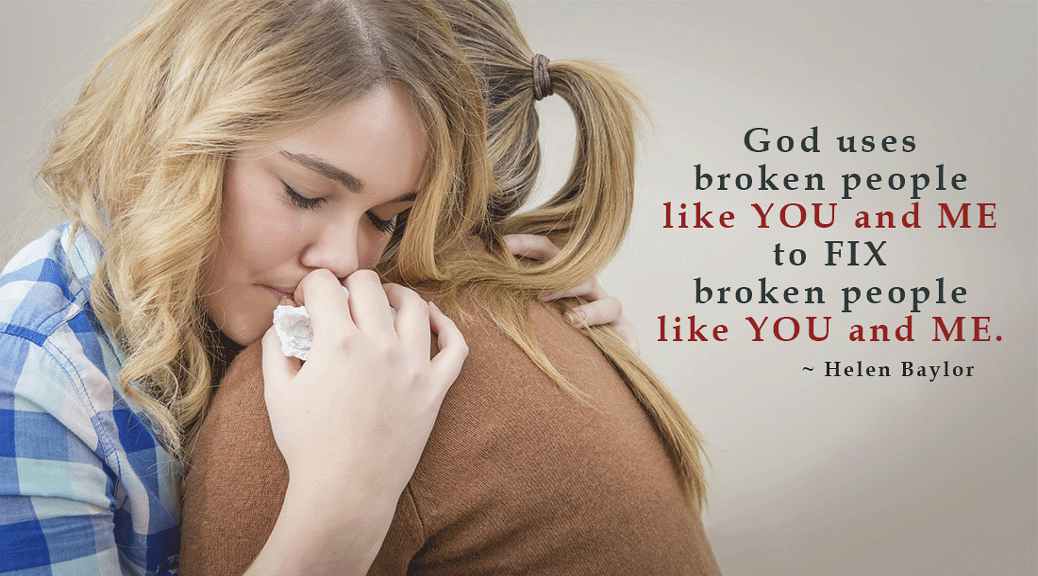This post was written by the well known George Barna. Although I may not agree with everything he said, this post is really worthwhile reading:
As an important albeit difficult stop on the journey, brokenness enables us to get beyond ourselves and recognize our need for God’s complete, continuing and uninterrupted intervention in our life. For us to become the people God intends us to be, brokenness is not an optional possibility; it is a necessity. In this article we’ll explore how the act of being broken occurs.
As best I can tell, there are two ways in which brokenness can take place. The first is for us to recognize the problem that mandates the need, understand what brokenness means, and will ourselves into a place of brokenness before God. This requires that we understand the impact of our sin against God, of usurping God’s authority and taking His place on the throne of power, and of taking our cues from society rather than God’s Word. Cut to the heart by our callous insensitivity toward Christ and our consistent wrong doing against a holy and loving deity, we would therefore experience a life-shattering realization of our selfishness, independence, control, and evil. We would desperately throw ourselves on the mercy of God, pleading with Him to forgive our narcissistic and unrighteous behavior. We would find ourselves on the threshold of depression and despair, wholly distraught over our indefensible choices and the effect they have on our relationship with both a loving and benevolent God as well as the people whom we are called to bless. We would be virtually impotent to continue to live without God absolving us of our spiritual sickness, powerless to keep going without His willingness to walk alongside us from now on.
Such a response is theoretically possible and is the approach that many ministries equip us to pursue. However, after conducting thousands of interviews regarding people’s transformational journey, and numerous case studies, I have yet to encounter a single individual who has successfully broken himself.
So that leads to the second means to brokenness. That is allowing God to do it His way. In every case of successful brokenness I’ve studied, it has been initiated by God. He does this by allowing us to endure a life crisis. If the expression “successful brokenness” seems a bit odd, please know that it is an intentional choice of words. It refers to the fact that God often strives to work with us to facilitate our brokenness but we usually resist, resulting in a missed opportunity to minimize ourselves and maximize God’s presence and authority in our lives. Urged on by our secular society, we remain full of ourselves, leaving little room for God to be present in our lives. In fact, our worldview does not interpret life crises as examples of God at work in our life. Rather, we view such challenges as instances of “bad luck,” “chance,” “unfortunate circumstances,” “the circle of life,” “negative karma,” or “the randomness of life.”
To some people it may seem unlikely, unnecessary, or even unloving for God to expose us to harsh circumstances in order to break us. With our upbeat and optimistic theology, a view that glosses over the roles of persecution and suffering, we believe that God’s primary interest is in providing the best for us at all times. We explain away the hardships visited upon Moses, David, Jesus, and Paul. We are aghast when we are told that God loves you so much He allowed you to face another crisis, which He followed up with pain and suffering in all four life dimensions (emotionally, psychologically, physically, spiritually) in order to more perfectly shape us into His image. How, we wonder, is that the work of a loving God?
Actually, the crisis approach is a response to our own refusal to work with Him any other way. It’s not like He hasn’t tried to get our attention through a variety of alternative means. We have left Him little choice besides situational confrontation.
- He tried to reach us emotionally through our understanding of what His own son, Jesus Christ, went through on our behalf, including how Jesus was broken of (our) sin.
- He used sermons and other forms of instruction in an effort to penetrate our intellect.
- He used the Bible as another conduit of psychological challenge, describing His principles, commands, stories, and warnings in the form of narratives, poetry, and polemics.
- He exposed us to the suffering and hardships of others, hoping we’d learn the lesson vicariously.
- He even went to the other end of the continuum and tried to penetrate both our head and heart through excessive, undeserved, and frequent blessings, only to see us miss the point by taking those for granted.
- You can’t say God didn’t go all out in His efforts to rip us out of our comfort zone in softer and gentle ways. But because we constantly resisted His efforts, He has unleashed what may well be the last resort, snapping us to attention in the same way that He broke His Son: through physical hardship and anguish.
By the way, my research found that a majority of people who are finally broken experience harsh circumstances time after time after time. Why? Because the first time or two – or three or more – we take our cues from a culture that says brokenness is for weak losers. We see nothing positive emerging from those difficulties. Instead we deem those challenges to be tests that will prove our worthiness through self-reliance, independence, personal strength, and perseverance.
Sadly, we fail to learn from experience, either ours or that of others whose challenges we observe. Everyone experiences similar hardships, and we go through them over and over. Among the most common forms of crisis that lead to brokenness are imprisonment, debilitating illness or injury, the painful or prolonged death of a loved one, personal bankruptcy, acrimonious divorce, and the loss of possessions in a natural disaster. There are countless other challenges as well, but the research found that a majority of people have undergone these difficulties one or more times en route to brokenness.
Society teaches us that crises are merely stumbling blocks on the path to victory, unfortunate barriers that we can convert into opportunities to show strength and determination. That mindset causes us to have to undergo two or more of these crises before we wake up to our need for God. Or, as John 3:30 reminds us, He must become greater and greater in our life, and we must become less and less.
It is also intriguing that most Christians interpret the reoccurrence of crises as signs of God’s disinterest, punishment, lack of engagement, or inability to protect us rather than as evidence of His involvement, love, care, and concern. This perspective reflects the heart of our worldview – one that is not so much Bible-centric as unrealistic and secular in nature. While the scriptures talk about the centrality of discipline and the refining fire, we cling to a God who shields us from any painful experiences that might help us to grow in our relationship with Him. Consequently, when we get beaten down by life, we question God’s love and power. We assume that He has abandoned us or remains indifferent to our plight.
That worldview misses the point. God’s goal is not to break our spirit but to break our rebelliousness and independence. His efforts to guide us that were less debilitating met with our own indifference or rejection.
Ironically, our continued perseverance in the face of brokenness-inducing crises just produces additional suffering and doubt.
It need not be so hard, of course. The Lord has provided a simpler and easier way out for us, if we are willing to do things His way. In the next article we’ll explore how we can most efficiently cooperate with God in facilitating our brokenness.
(Reader’s Note: This is the third in a series of articles on stops seven through ten of the journey to wholeness. For more information about the common journey through which God transforms people, read George Barna’s book, Maximum Faith).
– George Barna
All local resources on this website are free of charge. Please help us by sharing it with your friends through the social networks. Social network sharing buttons available at the bottom of all pages






